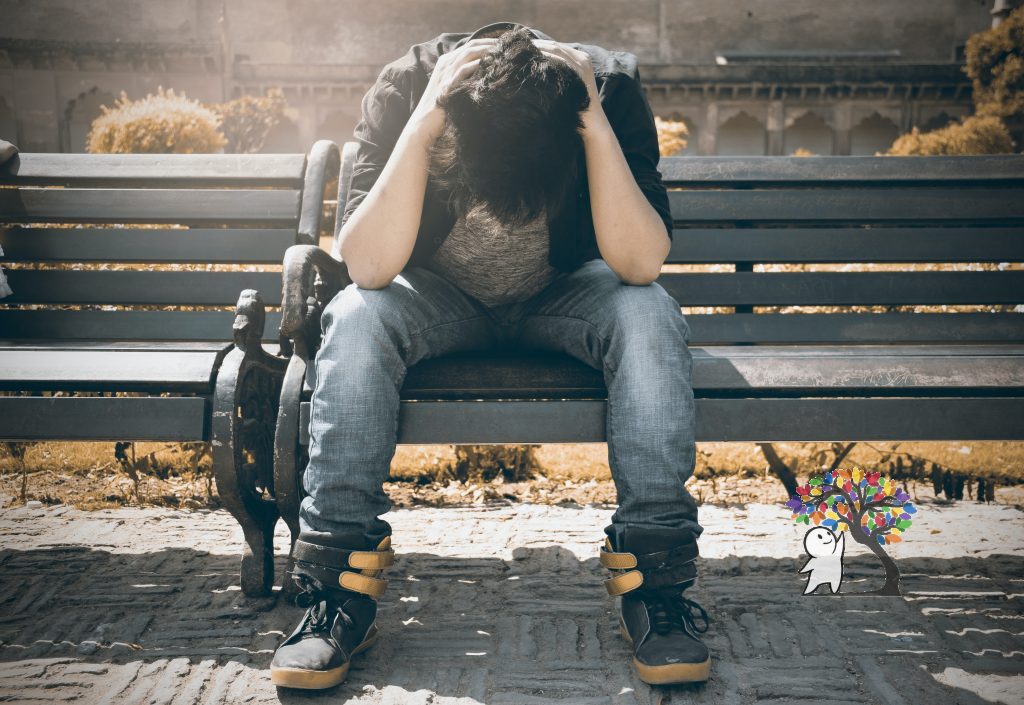Why You Feel Sad All The Time

Have you ever felt sad but didn’t quite know why? Do you ever struggle with feelings of guilt, loneliness, hopelessness, and the like without really understanding where it’s coming from?
Feeling sad from time to time is only a natural part of being human, as sadness is one of the many complex emotions we tend to experience. And even though we may not always know what could be the reason behind it, sometimes it’s enough to just let ourselves feel what we are feeling without any judgment and wait for it to pass, as all other emotions do.
But…what if it doesn’t? What if we start to feel sad more often than happy? Or down most days than not? What if struggle to overcome our own sadness and it starts to take over our lives and keep us from feeling anything but bleak and empty? Why do so many of us feel so sad all the time even though there seems to be nothing in particular causing us to feel this way?
Well, here are a few of the most likely reasons why:
1. You struggle with misattunement.
Misattunement is defined as the experience of not being seen, heard, or understood by those around you. And we usually have our first experience of this in our early childhood, when our parents either fail to satisfy our personal needs – be it physical or emotional – or misinterpret them (i.e. thinking you’re crying because you’re hungry, when really, you’re hurt). And the more we experience misattunement, the more we begin to believe that people cannot be trusted to be there for us when we need them. And so, not only does it hinder our social skills and communication, but it can also make us emotionally unavailable, afraid of commitment, and rejecting of our own personal needs (Gurgenidze, 2019).

2. You have a lot of self-loathing.
Self-loathing is something plenty of us are familiar with, and we struggle with it for most of our lives. We believe that anything good has to come from suffering first, that we need to overcome certain obstacles and work hard just to feel happy. But the truth is, happiness comes much easier than we think it does. We’re simply too stuck in our ways to see it.
If you’ve had a hard life growing up, or you’ve faced tragedies like loss, heartbreak, abandonment, and abuse, then it’s difficult to think of yourself as someone who should be happy. You listen to your own negativity because it’s all you’ve ever known, and the consistency in hurt is what makes it so comforting and so hard to let go of (Brown & Bosson, 2001).

3. You’re afraid to be happy.
Everything we love, we’re afraid of losing, and the same goes for our own happiness, too. We don’t feel comfortable letting ourselves be too happy because, in the back of our minds, we know it can’t last forever. And though they say “it’s better to have loved and lost than never to have loved at all,” very few of us actually find that statement comforting. It’s in our nature to be skeptical, guarded, and self-critical. We return to what’s comfortable and familiar, no matter how unhappy it makes us because changing for the better can be terrifying (Joshanloo, 2013).

4. You’re afraid to be vulnerable.
When you’re happy, you feel content and care-free. You don’t worry about getting hurt, rejected, or left behind by the people you love, and you don’t let failure keep you from pursuing what you want. But it’s very rare to find people who feel this way, because most of us have grown accustomed to being so defensive that it’s difficult to let our guard down for too long. We pull away from our closest relationships because intimacy scares us. We don’t let ourselves want something too much because disappointment stings too much. We keep falling in love with all the wrong people and getting burned by them time and time again because that kind of mistreatment is sometimes the only thing that makes sense to us (Liotti, 2004).

5. You’re in denial of your emotions.
Finally, but perhaps most importantly, the reason you may be feeling sad all the time but don’t know why is because you are in denial of your own struggles and trying to bottle up your emotions. Is there a certain grief or trauma you haven’t processed yet? Did you recently end a significant relationship in your life? Or lose a loved one? Was there a failure you still haven’t come to terms with yet? Or a betrayal you may still be reeling from?
Whatever the reason may be, you can’t keep repressing it and pretending like everything is fine when it isn’t. Because in order for you to finally move on and find some peace of mind, you need to come to terms with all your emotional turmoil first. Whether it’s regret, frustration, anger, disappointment, or loss that you’re dealing with, you need to be honest with yourself about it so you stop getting stuck in self-destructive, emotionally repressive patterns of behavior (Naditch, Gargan & Michael, 1975).

Searching for happiness can feel a lot like taking one step forward and two steps back sometimes. All too easily do we feel disenchanted with every good thing that comes our way. Falling in love leads to heartbreak and regret; friendships lead to fights and goodbyes; and achievement feels empty when we get it at long last.
Because the truth is, once we realize that our happiness is something we can control, a lot of us tend to fall into the trap of self-denial and self-sabotage. Sometimes happiness can feel scary, unfamiliar, and selfish. It’s usually so fleeting that we feel anxious to let it go, and when we unexpectedly encounter it, we often feel like we don’t deserve it.
If you or anyone you know is seriously struggling with feelings of depression, don’t hesitate to reach out to a mental healthcare professional today and get the help you need.
References:
- Gurgenidze, A. (2019). Mentalization and Shame in Context of Early Relational Misattunement (Doctoral dissertation, Adelphi University).
- Brown, R. P., & Bosson, J. K. (2001). Narcissus meets Sisyphus: Self-love, self-loathing, and the never-ending pursuit of self-worth. Psychological Inquiry, 12(4), 210-213.
- Joshanloo, M. (2013). The influence of fear of happiness beliefs on responses to the satisfaction with life scale. Personality and Individual Differences, 54(5), 647-651.
- Liotti, G. (2004). Trauma, dissociation, and disorganized attachment: Three strands of a single braid. Psychotherapy: Theory, research, practice, training, 41(4), 472.
- Naditch, M. P., Gargan, M. A., & Michael, L. B. (1975). Denial, anxiety, locus of control, and discrepancy between aspirations and achievements as components of depression. Journal of Abnormal Psychology, 84(1), 1.



Responses